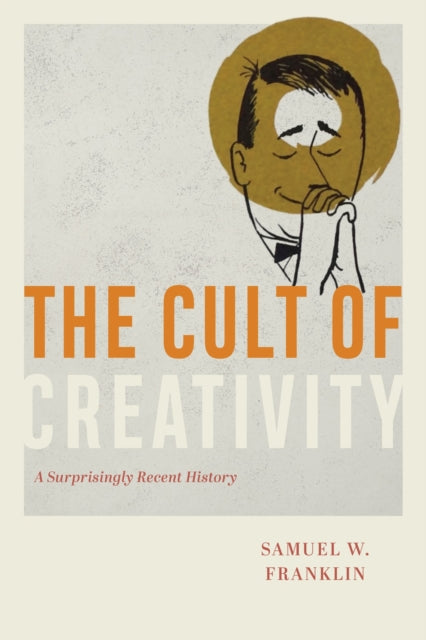Samuel W. Franklin
The Cult of Creativity: A Surprisingly Recent History
The Cult of Creativity: A Surprisingly Recent History
YOU SAVE £2.15
- Condition: Brand new
- UK Delivery times: Usually arrives within 2 - 3 working days
- UK Shipping: Fee starts at £2.39. Subject to product weight & dimension
Bulk ordering. Want 15 or more copies? Get a personalised quote and bigger discounts. Learn more about bulk orders.
Couldn't load pickup availability
- More about The Cult of Creativity: A Surprisingly Recent History
In the mid-twentieth century, the concept of creativity emerged in America as a response to the demands of capitalism and the Cold War. It was championed by professionals as a cure for conformity and alienation, and was seen as a force of individualism and the human spirit. Today, it is sought after, quantified, and maximized, but Franklin's history helps us to see what it really is and whom it serves.
Format: Hardback
Length: 264 pages
Publication date: 18 April 2023
Publisher: The University of Chicago Press
In the mid-twentieth century, a profound shift occurred in our understanding of creativity, transforming it from a mere notion to a cornerstone of American society. This transformative journey was meticulously documented by Samuel W. Franklin in his groundbreaking book, "Creativity: The History of an Idea." Recognized as a "best book of 2023" by the esteemed New Yorker and a "notable book of 2023" by Behavioral Scientist, Franklin's work delves into the origins and evolution of this concept.
While creativity has always been a fundamental aspect of human expression, the idea of cultivating it as a distinct discipline emerged relatively recently. It was in the 1950s that the term "creativity" began to permeate our daily conversations, marking a significant milestone in its cultural significance.
The post-World War II era in America played a pivotal role in shaping the concept of creativity. As the nation emerged from the shadows of war, a sense of urgency and determination to meet the demands of a rapidly evolving capitalist economy and the challenges posed by the Cold War took center stage. In this context, a group of professionals, including psychologists, engineers, and advertising experts, championed creativity as a means to unleash the full potential of individuals and foster innovation.
Creativity was viewed as a powerful tool to combat the conformity and alienation that these professionals believed were stifling American ingenuity. They saw it as a force of individualism and the human spirit, a means to break free from the constraints of traditional systems and forge new paths. Creativity was promoted as a solution to a wide range of problems, from corporate dullness to urban decline, and it was embraced as a new middle-class aspiration that aligned with the needs of corporate America and the spirit of anticommunism.
Amid the increasingly rigid systems of the time, creativity took on an air of romance and mystique. It was seen as a more democratic quality than genius, accessible to all individuals rather than just a select few. The term itself lacked a clear definition, allowing a wide range of people and institutions to claim it as a solution to their problems. Corporations sought to harness creativity to boost productivity and market competitiveness, while governments and non-profit organizations used it to address social and economic challenges.
However, as the demand for creativity continued to grow, it became increasingly quantified and maximized. The focus shifted from fostering individual creativity to optimizing organizational performance and achieving measurable outcomes. Creativity became a commodity, measured through metrics such as innovation, productivity, and market share.
In today's world, where creativity is relentlessly sought after, quantified, and maximized, Franklin's comprehensive history of the concept provides a valuable lens through which we can understand its true essence and its intended beneficiaries. The book challenges us to question the dominant narratives surrounding creativity and to explore its potential for fostering meaningful change and promoting human flourishing.
Through his meticulous research and insightful analysis, Franklin reveals the complex interplay between cultural, social, and economic factors that have shaped our understanding of creativity. He explores the historical roots.
Weight: 566g
Dimension: 161 x 237 x 26 (mm)
ISBN-13: 9780226657851
This item can be found in:
UK and International shipping information
UK and International shipping information
UK Delivery and returns information:
- Delivery within 2 - 3 days when ordering in the UK.
- Shipping fee for UK customers from £2.39. Fully tracked shipping service available.
- Returns policy: Return within 30 days of receipt for full refund.
International deliveries:
Shulph Ink now ships to Australia, Belgium, Canada, France, Germany, Ireland, Italy, India, Luxembourg Saudi Arabia, Singapore, Spain, Netherlands, New Zealand, United Arab Emirates, United States of America.
- Delivery times: within 5 - 10 days for international orders.
- Shipping fee: charges vary for overseas orders. Only tracked services are available for most international orders. Some countries have untracked shipping options.
- Customs charges: If ordering to addresses outside the United Kingdom, you may or may not incur additional customs and duties fees during local delivery.


